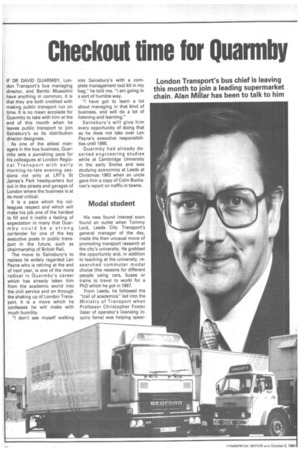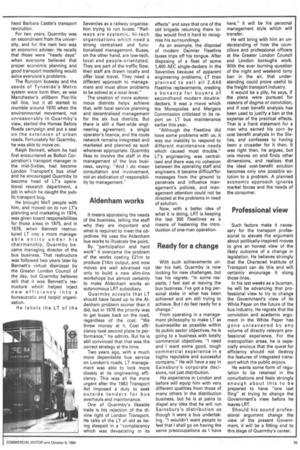Checkout time for Quarmby
Page 82

Page 83

If you've noticed an error in this article please click here to report it so we can fix it.
IF DR DAVID QUARMBY, London Transport's bus managing director, and Benito Mussolini have anything in common, it is that they are both credited with making public transport run on time. It is no mean accolade for Quarmby to take with him at the end of this month when he leaves public transport to join Sainsbury's as its distribution director designate.
As one of the ablest managers in the bus business, Quarmby sets a punishing pace for his colleagues at London Regional Transport with early morning-to-late evening sessions not only at LRT's St James's Park headquarters but out in the streets and garages of London where the business is at its most critical.
It is a pace which his colleagues respect and which will make his job one of the hardest to fill and it instils a feeling of expectation in many that Quarmby could be a strong contender for one of the key executive posts in public transport in the future, such as chairmanship of British Rail.
The move to Sainsbury's to replace its widely regarded Len Payne who is retiring at the end of next year, is one of the more radical in Quarmby's career which has already taken him from the academic world into the civil service and on through the shaking up of London Transport. It is a move which he confesses he will make with much humility.
"I don't see myself walking into Sainsbury's with a complete management tool kit in my bag," he told me. "I am going in a sort of humble way.
"I have got to learn a lot about managing in that kind of business, and will do a lot of listening and learning."
Sainsbury's will give him every opportunity of doing that as he does not take over Len Payne's executive responsibilities until 1985.
Quarmby had already deserted engineering studies while at Cambridge University in the early Sixties and was studying economics at Leeds at Christmas 1963 when an uncle gave him a copy of Colin Buchanan's report on traffic in towns.
Modal student
His new found interest soon found an outlet when Tommy Lord, Leeds City Transport's general manager of the day, made the then unusual move of promoting transport research at the city's university. He grabbed the opportunity and, in addition to teaching at the university, researched commuter modal choice the reasons for different people using cars, buses or trains to travel to work) for a PhD which he got in 1967.
From Leeds, he followed the "trail of academics" led into the Ministry of Transport when Professor Christopher Foster (later of operator's licensing inquiry fame) was helping spear head Barbara Castle's transport revolution.
For two years, Quarmby was on secondment from the university, and for the next two was an economic adviser. He recalls that those were "heady days" when everyone believed that proper economic planning and good transport modelling would solve everyone's problems.
The Runcorn busway and the seeds of Tyneside's Metro system were born then, as was Manchester's stillborn Picc-Vic rail line, but it all started to crumble around 1970 when the environmental movement, not unreasonably in Quarmby's view, started the Homes Before Roads campaign and put a seal on the extension of urban roads. Fortunately for Quarmby, he was able to move on.
Ralph Bennett, whom he had first encountered as Bolton Corporation's transport manager in the mid-Sixties, had become London Transport's bus chief and he encouraged Quarmby to become head of LT's operational research department, a job in which he caught the public transport bug.
He brought MoT people with him, and moved on to run LT's planning and marketing in 1974, was given board responsibilities for those areas in 1975, and in 1978, when Bennett restructured LT into a more manageable entity under his chairmanship, Quarmby became managing director of the bus business. That restructure was followed two years later by Bennett's virtual dismissal by the Greater London Council of the day, but Quarmby believes still that it was Bennett's restructure which helped inject new efficiency into a bureaucratic and torpid organisation.
He labels the LT of the Seventies as a railway organisation trying to run buses. "Railways are systemic, hi-tech organisations which need a strong centralised and functionalised management. Buses, on the other hand, are low-tech, local and people-orientated. They are part of the traffic flow, their staff are drawn locally and offer local travel. They need a different approach to management and must allow problems to be solved at a local level."
The creation of more autonomous districts helps achieve that, with local service planning and decentralised management for the six bus districts. But there is still a fleet-wide engineering agreement, a single operator's licence, and the route network remains integrated and marketed and planned as such wherever appropriate. Quarmby likes to involve the staff in the management of the bus business, saying: "And I do mean consultation and involvement, not an abdication of responsibility by management."
Aldenham works
It means appraising the needs of the business, telling the staff why they are important and what is required to meet the objectives. He uses the Aldenham bus works to illustrate the point.
By "participation and hard work" it overcame the problem of the works costing £21m to produce £14m output, and now moves are well advanced not only to build a new slim-line workshops but almost certainly to make Aldenham works an autonomous LRT subsidiary.
Quarmby accepts that LT should have faced up to the Aldenham problem sooner than it did, but in 1978 the priority was to get buses back on the road, regardless of the cost. "We threw money at it. Cost efficiency took second place to performance," he admits. But he is still convinced that that was the correct strategy at the time.
Two years ago, with a much more dependable bus service on London's roads, LT management was able to look more closely at its engineering efficiency. This was all the more urgent after the 1983 Transport Act imposed a duty to seek outside tenders for bus overhauls and maintenance.
One of Quarmby's likeable traits is his rejection of the divine right of London Transport. He talks of the LT of old as being steeped in a "complacency which was devastating in its effects" and says that one of the old brigade returning there today would find it hard to recognise his surroundings.
As an example, the disposal of modern Daimler Fleetline buses trips off his tongue. After disposing of a fleet of some 1,400 AEC single-deckers in the Seventies because of apparent engineering problems, LT then planned to sell all 2,6 4 6 Fleetline replacements, creating a bonanza for buyers of secondhand modern doubledeckers. It was a move which the Monopolies and Mergers Commission criticised in its report on LT bus maintenance earlier this year.
"Although the Fleetline did have some problems with us, it was our inability to respond to different maintenance needs which caused most trouble." LT's engineering was centralised and there was no cohesion between the operating staff and engineers. It became difficultior messages from the ground to penetrate and influence management's policies, and management attention could not be directed at the problems in need of solution.
Now, with a better idea of what it is doing, LRT is keeping the last 350 Fleetlines as a means of hastening the introduction of one-man operation.
Ready for a change
With such achievements under his belt, Quarmby is now looking for new challenges, but has his regrets. "In some respects, I feel sad at leaving the bus business. I've got a big personal stake in what has been achieved and am still trying to achieve. But I do feel ready for a change."
From operating in a management philosophy to make LT as businesslike as possible within its public sector objectives, he is going to a business with totally commercial objectives. "I need and I want some good, tough commercial experience in a highly reputable and successful company." He will have a say in Sainsbury's corporate decisions, not just distribution.
His experience in London and before will equip him with very different qualities from those of many others in the distribution business, but he is at pains to dispel any idea that he will run Sainsbury's distribution as though it were a bus undertaking. "I wouldn't want people to feel that I shall go on having the same preoccupations as I have here." It will be his personal management style which will transfer.
He will bring with him an understanding of how the councillors and professional officers at the Greater London Council and London boroughs work. With the ever burning question of the night and weekend lorry ban in the air, that understanding could prove useful to the freight transport industry.
It would be a pity, he says, if the plans were pursued for reasons of dogma or conviction, and if cost benefit analysis has been used to justify a ban at the expense of the practical effects. That is a frank statement for a man who earned his corn by cost benefit analysis in the Sixties, and confesses to having been a crusader for it then. It was right then, he argues, but one moves on and finds other dimensions, and realises that the ideal cost-benefit solution becomes only one possible solution to a problem. A planned economic approach ignores market forces and the needs of the consumer.
Professional view
Such factors make it necessary for the transport professional to elevate the argument about politically-inspired moves to give an honest view of the likely outcome of a change in legislation. He believes strongly that the Chartered Institute of Transport can do this and will certainly encourage it along those lines.
In his last weeks as a busman, he will be advancing that professional view to try to change the Government's view of its White Paper on the future of the bus industry. He regrets that the conviction and academic argument in the White Paper has gone unleavened by any volume of directly relevant professional experience. For the metropolitan areas, he is especially anxious that the quest for efficiency should not destroy the features of integrated transport which the public enjoys.
He wants some form of regulation to be retained in the conurbations and feels strongly enough about this to be prepared to have "one last fling" at trying to change the Government's view before he leaves LRT.
Should his sound professional argument change the view of the present Government, it will be a fitting end to this stage of Quarmby's career.




























































































































































